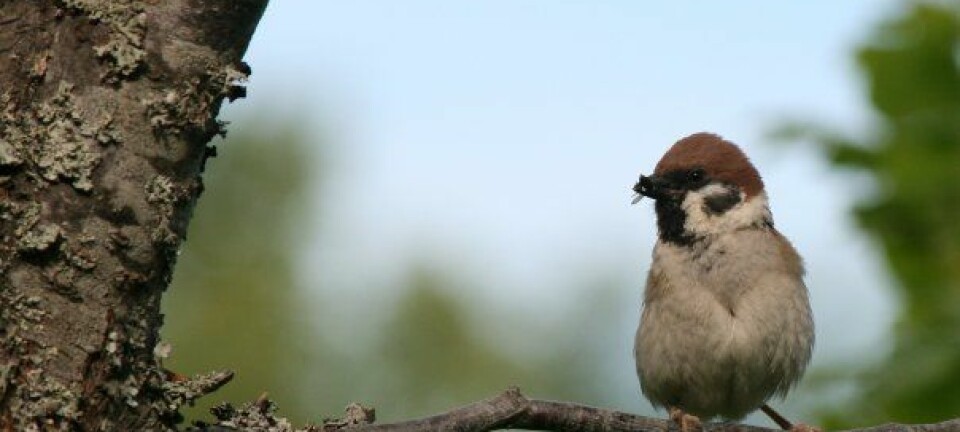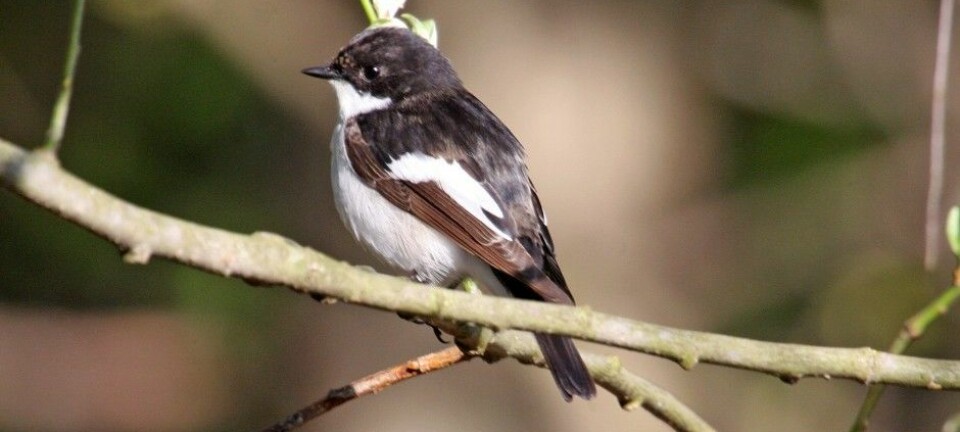Clever ravens can plan one step ahead
The birds are as good at planning as a four-year-old child or a chimpanzee.
If you think crows, ravens, magpies or other members of the corvid family have eyed you in an intense scrutinizing way you are probably not far off target.
More is going on in their little skulls than scientists previously believed.
Ravens can learn to plan for the next day and they can engage in bartering with humans, shows a new Swedish study.
Waiting patiently for a reward
Researchers at Lund University conducted a series of four experiments testing the abilities of five ravens.
The birds were given several tools, but only one fit an apparatus with a treat inside.
First they were offered the opportunity to investigate the apparatus. Then it was removed and after an hour various objects that could be used as tools were made available in another spot.
Fifteen minutes later the apparatus was brought back in. Most of the times the ravens chose the right tool to open it up. One innovative female worked out a way of opening the box without a tool. She was removed from the test and the remaining birds selected the right tool 86 percent of the time.
The researchers also offered a less attractive treat outside the apparatus. The birds could only choose one treat or another, not both. The ravens were not interested in discarding their future expectations for a more immediate reward.
The birds would pass the available, less rewarding treat because they reasoned that a better one could be obtained from the apparatus. Every raven chose the right tool to get the better morsel of food in this experiment.
Art of the deal
Even birds know something about “the art of the deal” with human beings. Ravens learn to trade a token immediately for food when researchers set up the opportunity 35 times.
Then they were asked to trade for food when they had no token, and experienced that they received no treat.
An hour later the birds got a chance to select a token among three irrelevant, distractor objects on a tray. Such trays were presented three times in succession, meaning they could save up to three tokens. These were offered by a different researcher who had no history of trading tokens for food.
The ravens were smart enough to take the tokens from the stranger and fifteen minutes later their old trading partner turned up and they were able to complete their transaction.
The ravens bartered 78 percent of the tokens for food.
Saving for the next day
The birds also succeeded most of the time when the apparatus that dispensed food did not show up until 17 hours later.
When the ravens discovered that the opening of the dispenser by tool or by bartering did not occur until the following day they saved their tool or currency and waited patiently for the market to open.
This makes these corvids as apt as chimps, gorillas and orangutans at using tools, planning and demonstrating self-control. And they even beat apes in bartering skills.
The ravens also out-perform four-year-old children in similar experiments.
Flexible bird
To prove that this entailed intelligent and flexible adaptation, the researchers had to make sure that the ravens were not doing anything they had experienced before. Otherwise, the birds would just be doing what they always do, perhaps instinctively, using the same methods.
In nature, corvids collect and store food for later use. They also make sure they eat the food before it becomes inedible. They are used to defending their caches against thieves. But they are not above engaging in some thievery themselves and they manage to predict what other ravens will be doing according to an article in the journal Science.
In nature ravens do not use tools, nor do they barter objects for food. So the researchers assert that their experiments showed the birds used their brains to tackle new situations.
Just one type of intelligence
Last year the same Swedish researchers, collaborating with British and German colleagues, found that ravens were as smart as chimpanzees with regard to impulse control.
But such studies only measure one type of intelligence, asserts Petter Bøckman, a well-known zoologist at the University of Oslo’s Natural History Museum.
Bøckman thinks it could be going too far to say that ravens are as intelligent as chimps.
“We don’t know whether these birds can do other things that primates are capable of,” he says.
However, the Swedish researchers have also found that ravens have the ability to wait a long time and seem to approach the great apes when it comes to planning.
They emphasise that the abilities and intelligence of mammals and birds have evolved independently. Our latest common ancestor lived 320 million years ago, long before the first dinosaurs evolved.
Crows are smart too
Other researchers have experimented with birds in the corvid family and seen that they too have impressive memories.
A crow can recognise your face and can carry a grudge for several years if you first do something that makes you unpopular.
Magpies are no saints. They readily gang up to peck at a poor bullied victim.
Crows and eight-year-olds are about equally good at solving certain tests to receive a reward.
Another wise feathered friend is the cockatoo which can show sufficient self-control to deny itself food right in reach if the waiting period is rewarded with an even better morsel. This type of parrot can also select the correct tool to open a box and will not be fooled if it is given the wrong tool.
Translated by: Glenn Ostling





